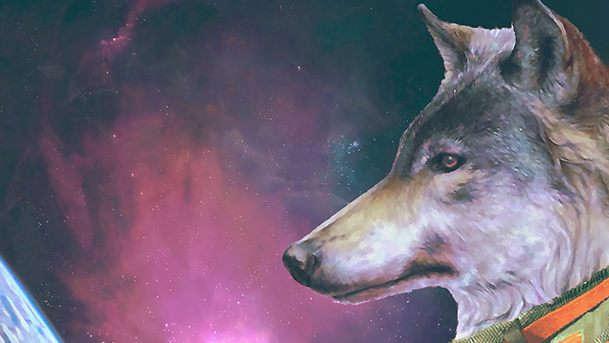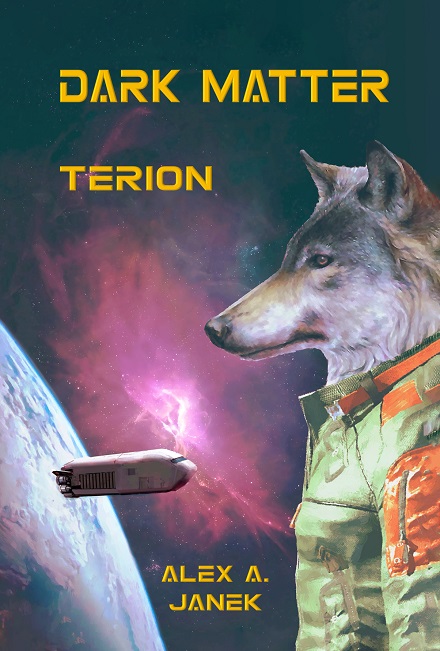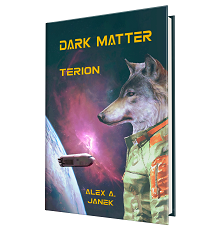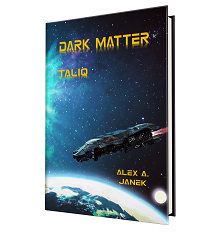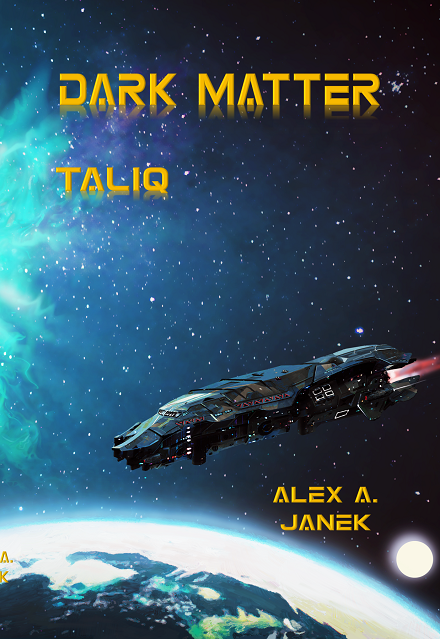Greetings travelers! Recently, we were afforded an interesting look beyond the stars, where we came into contact with the world of Terion, the main planet written of in Alex A. Janek’s Dark Matter series. It shows a great love for world-design, with rich and deep lore, multi-faceted culture, and endearing characters. More recently, we were able to speak to Alex, to discover where the idea came from, and where it could yet go. Read on to find out how the author ticks!
Tellest: Hello Alex! I wanted to thank you for your time in bringing some focus on your books and your process in writing it, as well as the inspirations that brought the Dark Matter series to life. I know that you have an extreme passion for the stories you write and that you perform exhaustive research to ensure that everything comes through with as realistic a feel as it can be. I’m excited to show that passion to new fans!
Alex A. Janek: It is a great opportunity revealing a little more about the Dark Matter series. Yes, over the last years, Dark Matter has become a passion. I realized now that I should have picked up writing much earlier in my life. The inspiration was always there, waiting to surface, and finally it had.
T: I always have a standard first question during these interviews: what made you what you are today, as far as your inspirations go? You’ve clearly had a tremendous amount of insight into science and the fiction around it. Did you have a sci-fi author who spoke to you in your youth, or did you have any other members of your community who seemed to push you in that direction?
AAJ: I was hooked on sci-fi since I have read the first sci-fi books in my youth, mostly short stories and then I watched Star Trek, the original series of course, then the classics like 2001, Omega Man, Colossus, Star Wars and later Alien and Blade Runner. Regarding the literature, Dune, War of the Worlds, 1984, Foundation, The Time Machine, were influential, just to name a few. But there was always my inquisitive nature, questioning the “reality” of these stories. I think this has also somewhat influenced my career choice to become a scientist. My criticism, also about the plots, became so annoying that my wife no longer enjoys going to the movies with me.
I know sci-fi is about the unknown, the possibilities that lay ahead, and the “what if” question going wild. Still, there are limits from the laws of physics, chemistry, and biology. That is why I am not a fan of fantasy where anything goes by just wishing for it. In Dark Matter, the characters have to earn their success without the aid of the Force, spells, or (technical) magic.
T: Then, on a more personal level, what would you say was the reason that you pushed to make Dark Matter a reality?
AAJ: Several impulses came together. The urge to write about a realistic future mentioned before was part of it. The most important reason to make Dark Matter a reality was my better half, however. She challenged me to write my own novel, if I ‘know everything better.’ And so, I did. Just for fun initially, but the more I explored the fantastic Terion world, the more I got hooked on continuing. It was as if from deep inside an urge had erupted.
T: What was your sort of “aha” moment when you realized you were doing something that went beyond just personal enrichment? What was it like when you realized you were going to release the book to a wider audience?
AAJ: In hindsight, it was not so much a specific moment for me, but a gradual process that drew me deeper and deeper into the Terion world, almost word by word. At the same time, I got more and more convinced that I struck on something that I wanted, no, needed to share with the world. And then, one day, one finally has the hard copy in his hand. It is a marvelous feeling.
T: Your main characters in this story are a bit different than what most people come to think of when it comes to hard sci-fi. While it’s not unheard of to picture aliens in sci-fi, it’s atypical to have them make up the lead team, especially when they’re anthropomorphic lupines. What made you decide to use them as your leads?
AAJ: Lupine, cheetah, hyena, fox and lion descendants, actually. They are quite different and populate the planet Terion, and yes, it is still hard sci-fi.
When I thought about writing Dark Matter, I wanted to do something new. All sci-fi I know—maybe I am wrong—is about a threat to (a) humanity. If it is not the archetypal, all too natural, human conflict developing in a futuristic setting like in Star Wars or Dune, it is asteroids, angry aliens, the threat of robots/artificial intelligence, disease, exploding suns and, so on. It is quite natural to think this way, and it is entertaining.
But I wanted something new, something different and asked: what if? What if not everything circles around humanity. What if there are other lifeforms? What do they do, how do they live their everyday life, and what can be a threat to them if they are so advanced? It is difficult to imagine the life of futuristic squids or jellyfish, or even more obscure lifeforms like in the movie Arrival, which was again about humanity. It would be difficult to get the reader involved and connected to these lifeforms, so I focused on mammalian life, which is closer to us and more relatable.
In this respect, my background in natural science came in handy. There is a process called convergent evolution. That is, the same evolutionary trajectories are followed independently, as if a universal force molds life in the same direction. Much like physical constrains in aquatic life, develop streamlined, torpedo shaped forms, like in fish, penguins, seals, and whales.
There is a high degree of convergence everywhere. Think of the now extinct marsupial wolf, also called the Tasmanian tiger. It had developed completely separately in Australia from very different ancestors than the common wolf. This wolfen bodyplan actually developed three times on different continents and their morphologically is hard to distinguish. There is even a high level of convergence in chemistry.
Then the question comes naturally: what if it had not been apes that became conscience and technologically advanced, but a group of carnivores? What would their society be like? Planet of the Apes scratches on this idea but stays within the primates.
T: What is your process when it comes to developing the Dark Matter books? Are you pretty much done when it comes to your research, or do you still need to dive into an article or an essay from time to time in order to make sure the content that you’re writing about is true to fact (or as much as it can be at this time)?
AAJ: Because of my interests, most of the natural science comes easily. Of course, I have to look up details. Already in school, I wondered about the simplified explanations and then tried to get a deeper understanding, only to find out that much of the science is not as straightforward as it is taught. In fact, there are quite serious limits to our knowledge, which makes science an exciting field.
However, when it comes to the societal or language issues, I have to research the topics deeper or get help from others.
T: When it comes to getting a team together to work on some pieces of this sweeping epic, how do you manage all the little corners of your galaxy? Do you have a pretty definitive view of how you want things to expand, or do you allow for some creative freedom from your partners?
AAJ: Working with others is inspiring. My editor is a sci-fi author himself and was very inspiring. He questioned or asked about a few concepts. His critical comments allowed me to hone and focus my ideas. Beta readers were also a great help. In areas where I have only little knowledge or experience, e.g. languages, art, I appreciate the creativity from others. As a team, one gets the best results. This is also a theme in Dark Matter.
T: What has been one of your greatest joys as it pertains to releasing these books? Have you found that the audience enjoying it has given you more motivation to continue along? Or has it been a sense of a more personal achievement that you find pleases you more?
AAJ: The two best reactions I got to Dark Matter were from a freelance copy editor and a beta reader. Both women said they are not fans of sci-fi, especially not hard sci-fi. At first, they were reluctant to work on the manuscript. I needed to convince them to work with me somehow, because I liked and trusted their work. In the middle of the process—we worked in blocks of ten chapters—they said they can’t wait to see how the story continues and ends. They were eager to work on volume two. WOW. What more can you ask for as a writer? I guess the reason is that the story has a lot of room for world building, personal relationships, character development, love, and emotions.
T: Conversely, what sort of challenges have you had along the road to seeing the books published? Did you run into any big roadblocks in the research process, or were there other bits of the story that had you circling the page trying to figure the next segment out? Or, was it something else entirely, like the marketing piece that had you scratching your head?
AAJ: As with, I guess, every author, there is the challenge on how to write and develop story arcs and characters. Writer’s block was a challenge too. I knew exactly what I wanted to write about, but then, in front of the computer screen, the mind went blank. Also, finding an end was hard. Originally, I wanted to tell Karuq’s story and that of the Terions in one volume. But then, I got caught up in the fantastic world of Terion and wanted to explore all of its details. The same with the characters. I had to limit myself to not exhaust the reader. I am not sure I succeeded, but then, when I read a captivating book, I don’t want it to end.
T: When it comes to writer’s block now, do you typically have a sort of response to it now? For instance, do you move onto another spot within your book to begin prepping for that? Or do you perhaps write something along the lines of sequel or prequel material? Or do you simply walk away for a bit to see if the moment passes?
AAJ: All the above and then some. To me, there is no single technique to overcome writer’s block and I don’t fear it anymore, because I have learned it is temporary. Often, I get my best ideas and inspiration by going jogging. But sometime this doesn’t help either and then I let the story sit for a couple of days or even weeks and months. Volume one took six years to complete. There is no use forcing it. More than once, I had the feeling the story was not coming together and I wouldn’t be able to finish it.
T: You’ve recently released the second book, but do you have a third on the way? What can you tell us about it if you do? Is this what you expect to be the final story in your series, or is there hope yet to see the universe that you’ve built here?
AAJ: Every volume is a closed story arc in its own right, but they are not truly finished, leaving space for more. A bit like Star Wars episodes. However, volume three will bring closure to Karuq, the hero’s arc. If all goes well, volume three will be finished early 2024. But then, there are so many more story arcs to tell. I have ideas for many more Dark Matter books: prequels, sequels, the history of Terion, the Terion language, the technology, the ancient war, the discovery of dark matter technology, the formation of the societal union from the different Terion species eons ago, exploring space, meeting other societies, and the (background) stories of individual characters. I feel like a human explorer of the Terion universe. My greatest fear is that a lifetime is not enough to tell all of it.
T: It likely wouldn’t be! You’ve created a sort of story generator that you could keep fueled up indefinitely. Even just creating a world is a massive feat, but you’ve created the potential to build so much further.
If you found yourself having fun with it, is there any reason you could see yourself wanting to walk away from it?
AAJ: No never! It is not only the satisfaction of writing a novel, publishing it, seeing it in print the first time, or watch others enjoying it. All of which are great experiences and addictive. Dark Matter has become much more to me. Maybe it sounds wild, but the Terion universe and their characters have shaped me as much as I have shaped them. More and more often I take a step back and ask myself what would my favorite character have done?
T: You’ve mentioned the name Karuq a couple of times, and it has a certain sort of familiarity even though it has alien origins. You also have other names like Hoanib and Amak that kind of allude toward names that sound similar to those one might have heard before. What made you decide on names like these?
AAJ: Good question. I could not use Jack, Mary, or Bob for my Terion characters, because these are human names. I didn’t want to use the combination of random letters/sounds either. So, as part of the world building, I modelled the names of the Terion characters after less known human languages in order to sound familiar.
In fact, I have developed a whole own Terion language. One gets a glimpse in volume two and I plan to include more of it in book three. I envision having an entire volume where a human hero learns more about it.
However, the Terion language is excruciatingly difficult with its one hundred phonemes, English has forty-four. Worse, the language is agglutinative. That is, morphemes and affixes are united into one long word. English is at the other end of the language spectrum (analytical language), it separates meanings. For example: “the modern lamp on the ceiling is red”, would become redmodernlamponceiling. Now include time (past, future) and casus (event, situation, or occurrence) and it becomes complicated for the non-native. Finish, Hungarian, and Inuit are examples of such languages. Because this was too simple, I included five different types of click sounds (! ^ ‘) and stops with different meanings.
And it gets still worse: we (humans) as ape descendants produce the phonemes (speech sounds), with our voice box, the larynx, and their different anatomical parts like the vocal chords, throat, and mouth. The anatomy of Terions has more possibilities. Think of the deep growl of a dog (in a Terion sense, a wolf descendant), that seems to come from inside the chest. I call these sub-guttural (‘throat’) and even deeper, tracheal (‘lung’), sounds. Because of them, the human hero, Reece, has difficulties to pronounce the names of the Terion characters. The name of the wolfen character ‘Karuq’ for example, becomes ‘Karugkch’ in the phonetic spelling, when Reece tries to say it, because the –uq is part of a sub- guttural (throaty) sound a human cannot produce.
T: I definitely thought I detected some familiar linguistic elements there, but I didn’t want to steal your thunder in the question! I hope that other readers end up getting those feelings of familiarity when they’re reading your book.
Though science is certainly one of your callings in this book, your use of language and linguistics is also deliberate and crafty, as we just discovered. Did you know that you had this talent before you started, or was it something you learned about yourself along the way?
AAJ: I definitely do not have the talent for language and others are craftier with words and grammar. I am always learning, in particular from my editor. However, the idea of developing alien names from lesser known human languages came early during developing the concept of Terion. I knew enough of some languages, that I could begin experimenting. From there, it was only a small step to involve other languages to generate familiar sounding, yet alien, names.
When it came to developing the Terion language, however, I had a pretty good idea of what I wanted, but needed and enjoyed getting help from an expert. More about it in volume three.
T: You describe space travel using dark matter and dark energy fields, and in your story space travel does not happen in an instant. Instead, it respects the vast distances and time involved for some spacefaring species. Now, it’s all a bit beyond my understanding, but how exactly did you bring it all together to have it work out scientifically?
AAJ: Dark matter does not interact with light (‘bright’) matter that we know. However, with the help of field constrictors one can meld… oops, I’ve almost said too much. I had to promise not to reveal the technology. A hint to it is given in volume two. Discovering dark matter technology will be a Dark Matter volume in its own. At least the bits I can write about. A problem is that English, any human language, does not have the terms or concepts to describe the technology properly.
This much I can say: Terions developed dark matter technology during an ancient war with another advanced civilization. It is a dangerous technology, because of the magnitudes of energy and non-standard radiation that is involved. Also, melding dark matter can lead to run-away reactions.
T: You haven’t just stopped there though. While it would have been easy to just focus on the scientific points of the story, and maybe add a few words here and there that seemed to offer up a bit of alien characteristic to the universe, you’ve really given it a lived-in feeling. What are some other ways that you’ve helped to develop cultural impact for your races?
AAJ: Species, not races. To your question about the cultural impact and being different from humanity: I simply looked at the biology of the analogue species on Earth. Other aspects of their life are what they eat—not only meat, as Reece finds out—how they walk differently on their toes of their elongated feet is again biology. I needed to develop new measures of time, because for example a ‘second’ makes only sense in our, human, world. Yet a day, sunrise to sunrise, is a universal constant for all civilizations.
What Terions do in their spare time, for sports, or as hobbies, was inspired from human activities to make them relatable. Then, how do they work, bring up the children, get food, and how they live in a money and valueless society are new concepts, different from humanity? I let the human hero Reece wonder about these things, to get the reader involved. In every volume, the reader will discover a little more about the Terion universe. It is way too much for a single book and I will still not be finished describing the Terion universe in the third.
I am sure, in many aspects I made the Terions too similar to humans, in other aspects, the reader will be quite challenged to follow the concepts and there are aspects that even my editor struggled to grasp without extra explanations. I was striving for a good mix of many levels of possible reader evolvement and still make it feel natural, lived-in as you phrased it. And, those who will read the Dark Matter ‘only’ for the space adventure will absorb the Terion world in the passing.
What intrigued me, was the idea of harmony in a society with different species that all live together and value and respect their differences. It is an egalitarian society, but not in a sense that every species is the same or has the same values. How the Terions have overcome their differences during their societal fusion, eons ago, and if it even was a problem, is an idea for another Dark Matter book.
T: Is there anywhere out there that you would suggest someone could go to learn more about Dark Matter? Do you suggest something like Goodreads, or something along those lines?
AAJ: I am not proficient in social media. I have a Facebook page, Alex Janek, my pen name, but I am a terrible entertainer. I post a few milestones of the publishing process now and then, like the publication of the German edition of Dunkle Materie – Terion.
Your website is a great help get some information out. One can also learn more by using the “Look inside” function on Amazon to find out if the topic and writing style suits them. Amazon has been generous in publishing several chapters that one can read for free. Eight, I think. It is too soon for a fan base as a source for further information, but I hope there will be one soon.
Thank you so much for your questions, time, and interest. This was a perfect opportunity to explain some aspects of the Dark Matter series, there are many more to discover.
I’d like to thank Alex A. Janek once more for bringing his brand of sci-fi to Tellest, both in the promo we ran recently, and in this interview article. Dark Matter is certainly a different breed of sci-fi, with a lot of personality and heart to it, driven by the unshakable amount of research and care that Janek put into it. Remember, as he works on the third in the series, the first two are already available, and the first one is stellar. Check out Dark Matter: Terion on Amazon today!
Michael DeAngelo
Latest posts by Michael DeAngelo (see all)
- Fantasy Promo – Quinine - July 25, 2024
- Sigil Art – Grim’s Hold - July 24, 2024
- Fantasy Promo – Light the Shadows (Under Elfhame’s Stars) - July 24, 2024
